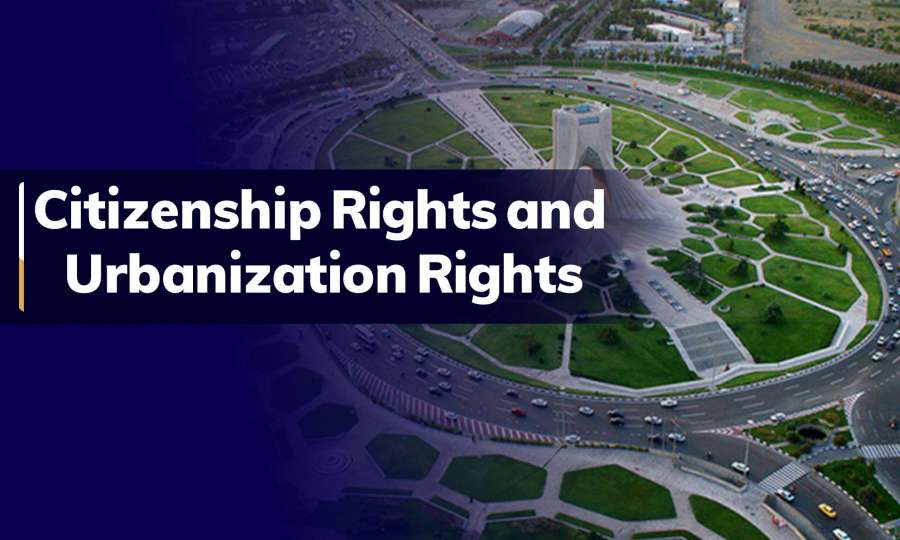It should be noted that the meaning of “city” in urbanization law is not just its word; rather, it is the characteristics of urban life; therefore, the name of a place may be a city or town (such as an industrial town); but urban life does not prevail there, and conversely, in a place, the name of the city may not exist; but the characteristics of urban life are prevalent there. Consequently, the criterion is the existence of the characteristics of urban life, not the word city.
Note: Hujjat lslam Dr. Ali Elahi Khurasani was born in 1984 in Mashhad, lran. After studying in Mashhad and Qum and benefiting from teachers such as Ayat lzam Hashemi Shahrudi, Ahmad Madadi, Muh. Taqi Shahidipur, and Mehdi Murvarid, he received his doctorate in jurisprudence and fundamentals of law from the University of Justice. For years, in addition to teaching in the field and university, one of his main concerns has been issues related to the city and urbanization. In this oral note, he analyzed citizenship rights and their difference from urbanization rights.
Citizenship rights and their requirements
Citizen rights, which arise from legal thinking and the centrality of man and human rights, refer to the relationship between citizen-state or citizen-sovereignty. In a rational and customary examination, it becomes clear that rights must be forged and implemented in relation to the life and improvement of the lives of citizens in every country. In our country, these citizenship rights have been consolidated in a text that was compiled in Mr. Ruhani’s government under the name of the Charter of Citizenship Rights has been officially and legally announced.
Citizenship rights and their requirements
Citizen rights deal with the relationship between people who live in a city. Human life in the city and the category of urbanization create a series of rights for city dwellers. In other words, wherever there is urban life, this urban life creates a series of rights for individuals to benefit from the facilities and opportunities in urban life. These urbanization rights can also result from these citizenship rights, both from human rights and from upstream rights and documents.
But in urbanization rights, our criterion is not the relationship of these individuals with the government in a country; rather, it is the characteristics and characteristics of urban life. That is, if the central legal signifier of citizenship is the relationship with the central government and its components, in urbanization rights, the central signifier is urban life. In fact, urban life is a new concept that creates a series of rights for city dwellers.
For example, the fact that all city dwellers are equal in terms of enjoying urban spaces or have equal access to urban facilities is included in the category of urbanization rights.
The difference between citizenship rights and urbanization rights
Citizenship rights consider the relationship between citizens and the state; what rights do citizens actually have that the state must provide? That is, the state is obliged to observe these rights of citizens, such as the right to freedom, the right to communicate, the right to assemble, the right to protest, and the rights of women; whether these citizens are in the city or in the countryside or in the nomads. It makes no difference. If this citizen is called an Iranian citizen, the state is obliged to respect, realize, and protect these rights for him.
However, the rights of urbanization, due to the fact that they depend on the existence of the urban environment, can only be realized in cities; therefore, in the countryside and the places where nomads live, such rights cannot be realized, and only citizenship rights exist. The rights of urbanization deal with any right that is imagined in relation to humans and the city.
Similarities between citizenship rights and urbanization rights
The similarity between citizenship rights and urbanization rights is that in both citizenship rights and urbanization rights, humans and human rights are central; That is, their similarity is both in the subject and in the subject matter, which is rights.
Extension of urbanization rights to villages
Here the question arises that considering the modernization of villages in recent years in terms of structure, administration, finance, culture, etc., can urbanization rights be extended to villages or not?
In response, it should be said: urbanization rights refer to urban life. Urban life has a series of characteristics and specifications, such as specific human relationships that govern urban life, population proportions, and specific facilities that together determine urban life.
If this urban life with these specifications exists in a modern and new village (which may be called a county or a district or anything else), it is natural that these urbanization rights are also valid there; but if urban life with the aforementioned specifications does not exist there, urbanization rights do not exist either.
It should be noted here that the meaning of “city” in urbanization law is not just its word; rather, it is the characteristics of urban life; therefore, the name of a place may be a city or a town (such as an industrial town); but urban life does not prevail there, and conversely, in a place, the name of the city may not exist; but the characteristics of urban life are prevalent there. Consequently, the criterion is the existence of the characteristics of urban life, not the word city.
This note is part of the electronic journal “Principles of the Jurisprudence of Citizen Rights” which was produced in cooperation with the Ijtihad Network website.

